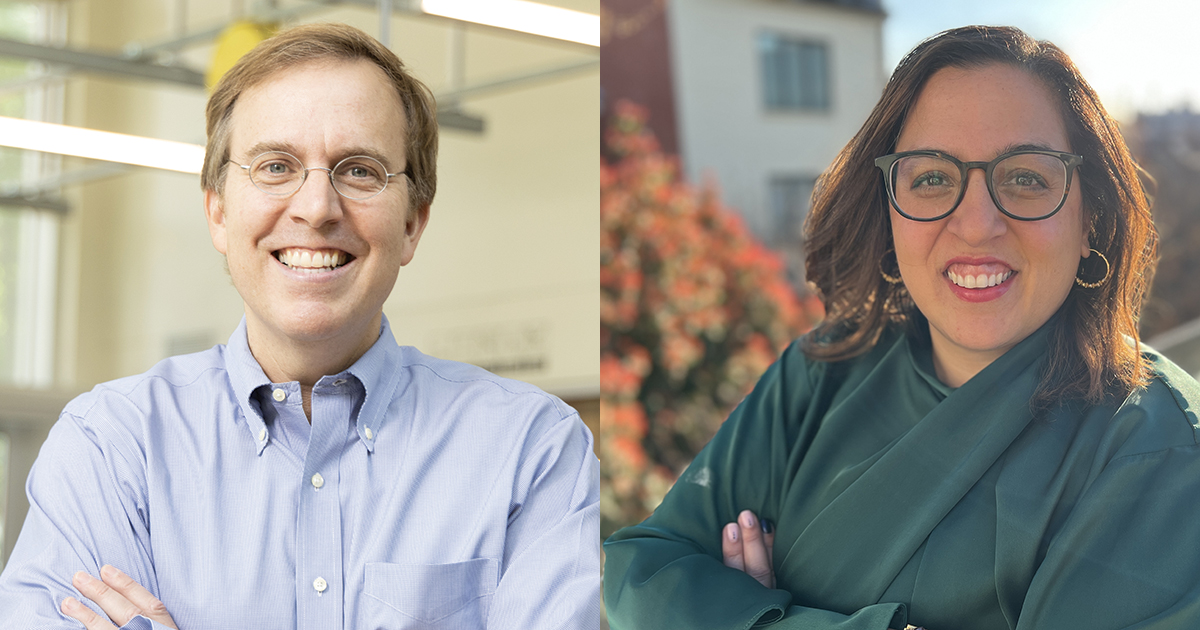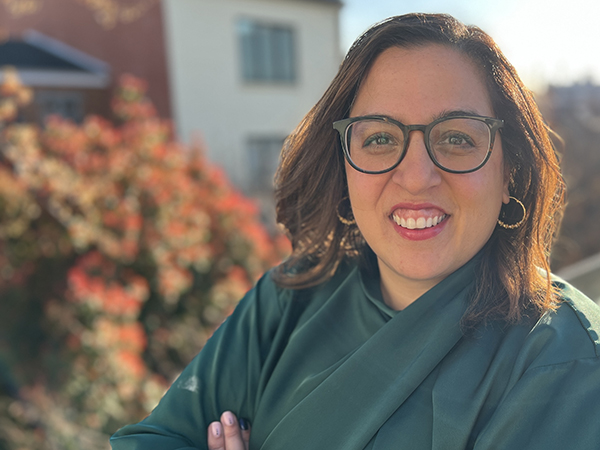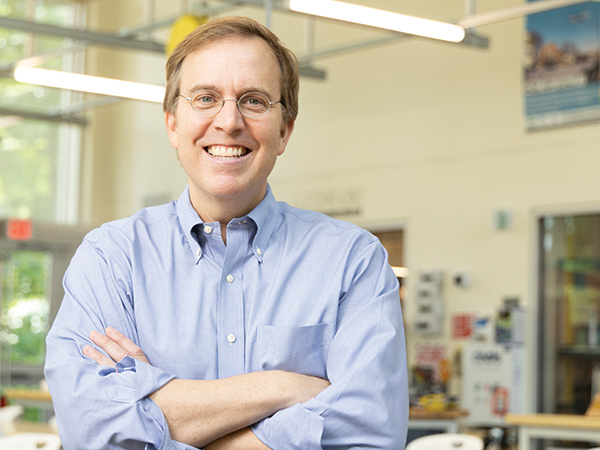Two Babson Faculty Honored Among Poets & Quants’ Best Undergraduate Professors

Anjali Bal and Erik Noyes have much in common.
The two Babson College associate professors are innovative, popular teachers who stand at the forefront of important and emerging issues in society, incorporating their research into their classrooms.
And, both were named Monday to Poets & Quants’ 50 Best Undergraduate Business Professors of 2023. Babson was one of 14 institutions with multiple faculty members selected from more than 650 nominations for the sixth edition of the list.
Bal, associate professor of marketing, focuses her research on diversity, equity, and inclusion (DEI) in arts, entertainment, and sports marketing. “These industries significantly impact the world around us and make up much of what we think of as culture,” she said. Bal, at Babson since 2014, also is an inaugural Babson Presidential Research Scholar and a longtime advocate for DEI in higher education. She was awarded the Babson Pride Award in 2020 and the Martin Luther King Jr. Leadership Award in 2022.
Noyes, associate professor of entrepreneurship, focuses his research on the potential of artificial intelligence (AI) to drive entrepreneurship and innovation. “AI can help entrepreneurs, educators and students innovate in entirely new ways – and we’ve only seen the beginning” he said. Noyes, who has been at Babson since 2007, also is the founding faculty director of the Weissman Foundry and recently was appointed The Michael London ’92 and Stephen H. Kramer ’92 Term Chair in Entrepreneurship.
Both Bal and Noyes shared their thoughts on their work, its impact on students, and this prestigious recognition.
Q&A with Anjali Bal
Your research centers on arts, entertainment, and sports marketing. How do you incorporate subjects that drive popular culture into the classroom, and how does it resonate with students, fans and non-fans alike?

“I always say, ‘I am a culture junkie.’ I have always been fascinated by learning about culture. Sports, arts, and entertainment are all at the forefront of culture. I have a rule that I don’t do any research that isn’t interesting. I find that if things are interesting to me, they tend to be interesting for students. Students tend to love when I bring research into the classroom. This year, that has meant looking at data from Disney, Simone Biles, Bud Light, Barbie, and more in my Principles of Marketing, Sports Marketing, and Brand Management courses. I tend to embed the data into classwork so that students are getting a more robust picture of the marketplace by doing their own research, reading articles, applying it, and, of course, seeing how I interpret what is going on in the market. I love bringing in data that shows fan behavior. Non-fans also seem to like to look at data because at the core it grants all of us the opportunity to examine phenomena in a more meaningful way. Plus, I love teasing New England fans; data just makes that teasing academically valuable.”
Sports and entertainment often are at the forefront of diversity discussions. How has that influenced your research, your teaching, and your advocacy on campus?
“Diversity, equity, inclusion, and accessibility (DEIA) are my passions. And, I would say that is true for every avenue of my life, from parenting and my private life to teaching and scholarship. Sports, arts, and entertainment are not only at the forefront of discussion but also the forefront of societal change. I am driven by seeing how we can do better as business leaders. I started my career in the arts because I believed the arts was the most powerful avenue to make change. I still believe that. Though I would add that sports and entertainment also have that power. Athletes like Serena Williams and Simone Biles are changing the world. But, so, too, are so many people who play sports for fun, on college campuses or at the national level. Accessibility has been a new area of learning for me. I have a cousin who worked for a civil rights organization for people who live with intellectual and developmental disabilities. And, I have learned so much about how we can do better as society for people with disabilities. As I have gotten older, come to terms with my own challenges, and become a mom, aunt, and professor, providing access to those who might not always have it, has become a driving force. Access is often the avenue to opportunity; when people have access and opportunity, they can drive the change our society desperately needs.”
As an innovative professor, what motivates you?
“Making the world a better place. Learning and connecting. And, having fun. Life is too short to be bored. You can quote me on that.”
What does this recognition from Poets & Quants mean to you?
“This is an amazing honor. I am humbled and grateful to my colleagues, alumni, and students for their unwavering support and kindness. I will endeavor to deserve it.”
Read more on Anjali Bal from Poets & Quants.
Q&A with Erik Noyes
You have been a leading figure at the crossroads of entrepreneurship and AI, integrating AI activities into classes last spring and developing a new course, Entrepreneurial Opportunities in AI, this fall. How do you incorporate such a fast-developing technology into the classroom? And, what has the reaction of students been so far?

“The short answer is constant experimentation with AI. My background before Babson was in corporate innovation and corporate new ventures, specifically focused on futurism. So, for the past 25 years, I have been tracking and interrelating technology and market trends. Starting in 2019, I made significant investments in the generative AI space, realizing that this is going to create such fascinating opportunities for how we teach in higher ed. Specifically, AI is not just all of the modeling and insane math, but it’s a breakthrough in human-computer interaction—there’s a computing accessibility breakthrough. For example, ChatGPT finally made AI broadly usable such that it’s an asset for experiential teaching and learning—that was a critical moment. If ChatGPT hadn’t happened, it would have been much more cumbersome to attempt all these innovations and experiments in the classroom. A sizable portion of Babson’s students are futurists, and they are living on the technical edge and are theoretically and practically fascinated with where the world is going on every dimension. It’s not that I’m just leading the students. It’s that we’re both totally on fire, and I’m trying to create a forum where we can co-process and experiment together.”
You also co-led the creation of The Generator, Babson’s new interdisciplinary AI lab at the Weissman Foundry. How has that evolved, and what are your hopes for the future?
“Artificial intelligence as a field is interdisciplinary, but people don’t conceptualize it that way. They think it’s about models and algorithms and math, and just the realm of computer scientists. But the field by its nature is much broader than that. So, a team of faculty from different disciplines at Babson—IT, theater, strategy, writing, and prototyping—we’re putting our arms around the broader scope of the field. We’re trying to help lead the College into the AI age, building AI capabilities and community among the faculty, and trying to quickly scale AI offerings and capabilities to the students. It’s a tight, six-member faculty team, and we’re leaning on Babson’s deep history of interdisciplinary collaboration to interpret and process this AI moment. In time, The Generator will be a globally leading interdisciplinary AI lab—I have no doubt. It’s a vehicle for Babson to yet again define entrepreneurship education, but it’s not just that. It’s about creative expression. It’s about idea generation in all fields. It’s about performance and art and design. It’s about new forms of AI-enabled collaboration. We have an opportunity to show the world how to do an interdisciplinary AI lab built on Babson’s one-of-a-kind culture.”
As an innovative professor, what motivates you?
“I’m an optimist, and I believe strongly in the importance of entrepreneurs and innovators to make the world a better place.”
What does this recognition from Poets & Quants mean to you?
“Babson is a wonderfully open-minded, interdisciplinary place, which respects individual and intellectual freedom. Each day, I’m inspired by the creativity of Babson’s students. Babson has an entrepreneurial culture that values teaching excellence. I love what I do, and I’m excited each day to collaborate with my colleagues.”
Read more on Erik Noyes from Poets & Quants.




